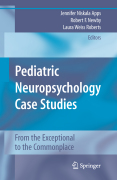
Pediatric neuropsychology case studies: from ordinary to exceptional
Apps, J.A.
Newby, R.F.
Roberts, L. Weiss
This book will be structured in such a way that readers can easily access individual cases of interest, as well as related areas of dysfunction. Each section will begin with an introductory chapter, highlighting the salient feature of the concept and providing brief, up to date reviews of the current research and theories. Individual case studies will serve as stand-alone chapters. Contributing authors will be provided extensive guidance and coaching with regardsto the standard format and information to be included in each chapter. The first section of this book will present cases involving neurological disorders. This section is to provide not only ‘classic’ examples of neurological dysfunction in children, but interesting cases of unique or remarkable presentations.The second section will present an accumulation of cases representing both common and progressive conceptualizations of developmental disabilities. Sectionthree will highlight cases which often present complex issues to neuropsychologists. First book to utilize a case study approach in neuropsychology where the focus is entirely pediatric but not limited to one etiologic etiology Will be the only reference of its kind Several chapters provide clinical case exemplifying innovative areas of diagnosis and treatment INDICE: From the contents Introduction.- Part I: ‘Dangers of Childhood’ Neurological Disorders. Introduction ‘Dangers of Childhood’. Traumatic brain injury in the preschool years. Traumatic brain injury in the school-aged years. Traumatic brain injury in adolescence. Frontal lobe injury. Left hemisphere injury. Right hemisphere injury. Traumatic brain injury interacting with psychosocial factors and family stress. Physical trauma with associated brain injury ‘Dog Attack’. Rare systemic infections ‘How?’ Encephalitic infection ‘Infected’.- Part II: ‘How It Can All Go Wrong’ Developmental Disabilities. Section Introduction ‘How It Can All Go Wrong?’ ADHD ‘Jeffrey’. ADHD as executive dysfunction ‘Mr. Disorganized’. ADHD Inattentive Type ‘Hello? Anyone Home?’ Reading Disorder ‘Just Try Harder’. Phonological awareness deficits ‘Say What?’ Rapid naming deficits ‘See…spot…run…’. Mathematics Disorder. Nonverbal Learning Disability. Pervasive Developmental Disorders.
- ISBN: 978-0-387-78964-4
- Editorial: Springer
- Encuadernacion: Cartoné
- Páginas: 375
- Fecha Publicación: 01/10/2008
- Nº Volúmenes: 1
- Idioma: Inglés
